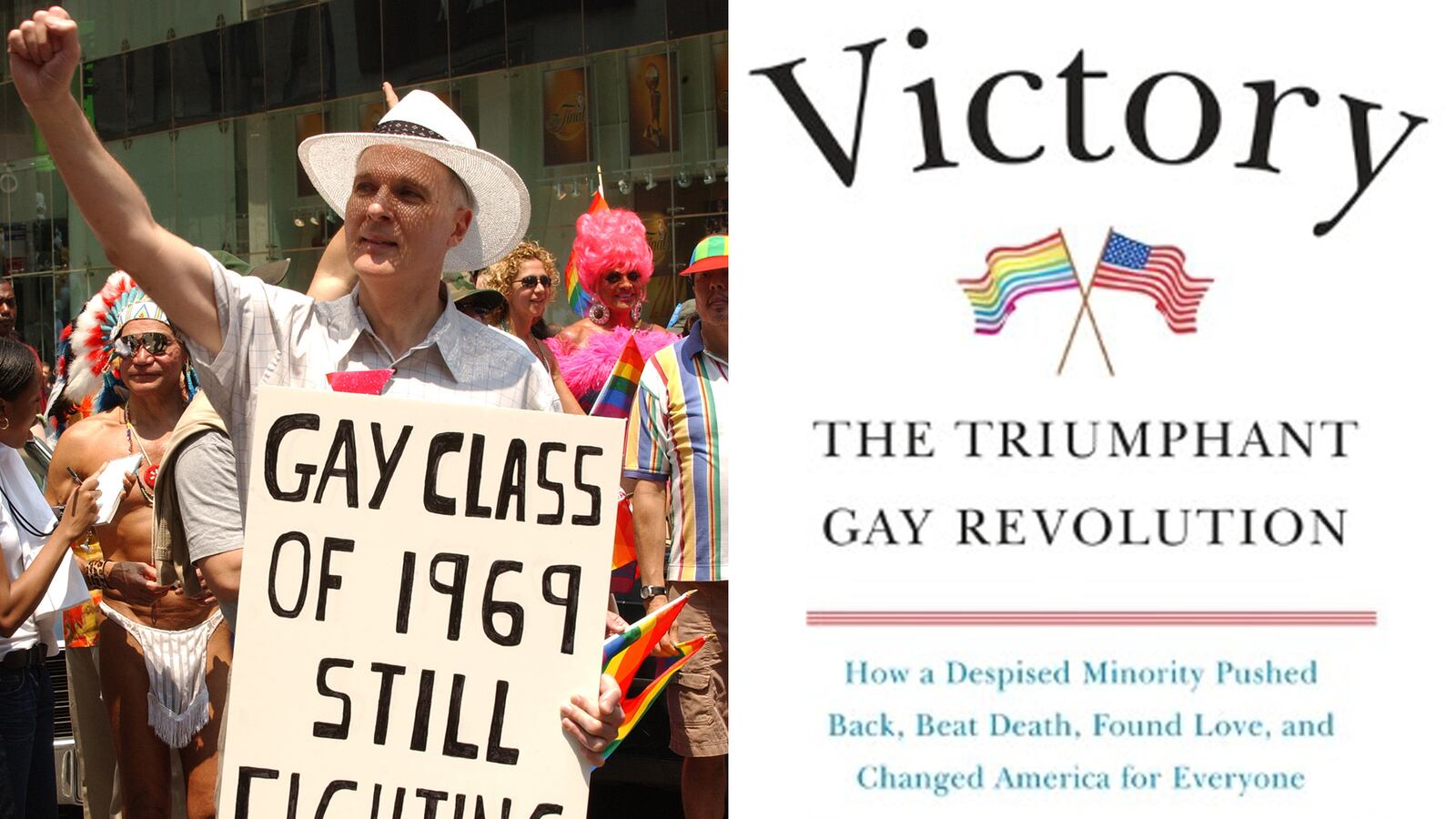Gay-pride parades will be held all across the country June 24 in commemoration of the Stonewall uprising on June 28, 1969. This year has been a monumental one in the gay movement, and a new book by Linda Hirshman, Victory, charts the long history of gays, lesbians, and transgender people fighting for equality. Jimmy So spoke with Hirshman about the influence of communism on the movement and what’s next on the agenda.
How did you come to write this book? In the late 1980s and early 1990s, I went to a seminar by Michael Sandel at Berkeley. He used the term “the gay revolution” in the lecture—and in the book he subsequently published on the lecture—as an example of a revolution that claims moral approval and not just tolerance. I took an interest in the movement at that time because of what Sandel said, and then I wrote about it sporadically for some years. Three years ago, after the Democratic primary of 2008, when I kind of had had it with feminism and with the self-destructive intersectionality of modern feminism, I decided I better find another book to write about. My mind went back to this movement, and I realized immediately that it was a takeoff. It’s so fun to get to write about a movement that, after all, did not think of everybody’s problems for their own.
Tell us a bit about the communism influence in the movement. Communism played an important role in all of the great American social movements. You have to ask yourself, why do so many progressive movements have roots in communism? I think the answer is that because communism gives people the tools to see that their oppression is the result of a set of political decisions to oppress them and is not natural or god-given. And that’s called oppositional consciousness. So it had little to do with things like the public ownership of the means of production or the categorical historical imperative. It had to do with the tools to recognize that oppression is a political phenonmenon and not a natural or divine phenomenon. And once people realize their oppression is politically based—once they have oppositional consciousness—then that’s necessary, if not sufficient, for them to organize to resist it.
In this particular case it isn’t necessary to argue whether the substantive tenets of communism are immoral or not, because its role in these movements is a procedural one.

What is the history behind the gay-pride parade? One of my absolute favorite examples of how smart and dedicated community organizers can transform an event into an opportunity. It really wasn’t a parade at first. There were marches. Franklin Kameny, in many ways the Martin Luther King of the gay revolution, had seen antiwar marchers marching in front of the White House—he lived in Washington. And after he saw the antiwar marchers marching, he decided that his little society in Washington should march and protest just like the other protest movements of the ’60s. So the gay-pride parade actually has its roots in a handful—12, 15, 25, 40 (the year before Stonewall)—of jacket-and-tied, skirted-and-pumps-wearing homosexuals and lesbians, a tiny group marching every year, first in Washington. And then they moved it to Philadelphia, on the Fourth of July.
So they marched in front of Independence Hall on the Fourth of July to protest that gays and lesbians were not included in the American experience. One of the people who marched in Kameny’s march in Philadelphia was Craig Rodwell, the owner of the Oscar Wilde Memorial Bookshop. And he went to the march six days after Stonewall, and all of the sudden there were like 75 people marching, because Rodwell brought a bunch of people who had been coming to his bookstore, and they were a raffish, bell-bottom bunch for a change. And on the bus on the way back to New York, Rodwell conceived the notion that they should move the march to New York, and that they should have it to commemorate the Stonewall uprising. He spent the next year organizing it as the next manifestation of Kameny’s marches.
And that’s what he did. So it was a community organizer who gathered his friends that he had. He did not include everybody. He did not include every cause. He simply gathered people he knew and could trust in his bookstore. They met every week, which is one of my rules for a successful social movement—have weekly meetings—and they planned. It took them a year. The gay revolution didn’t start at Stonewall. There were organized protests and organizations, especially in California and also in Chicago. It was part of the ’60s. So, they got in touch with the people in the other cities that were active in the gay movement prior to Stonewall, and they asked them if they wanted to join in and have a parade in their cities. Many of them said yes. So it got to be a national thing. In the first march, Rodwell stepped up into the square in front of the Stonewall bar and prayed that they would have 100 people. They wound up having thousands.
How does 2012 measure up to past monumental progress in the movement? Change has a way of accelerating. Somebody asked me in an event recently what I regretted leaving out, and I said I regret leaving out all the things that happened after I turned in my manuscript in. It’s been an amazing year.
It was teed up. It wasn’t like it was unforeseeable. People kept saying, oh, Linda, you’re so lucky that your book came out among all this. No, I saw it coming. My reaction is that pretty much everything that happened this year I saw it coming. It was clear that the legal system was going to produce victory after victory for the forces of the gay revolution, until it gets to the Supreme Court of the United States. So all of those court decisions I foresaw.
As to the other event, which is the president of the United States finally walking upright—evolving to the point where he can walk upright on gay marriage—I think that he was trapped, absolutely trapped, just like he was trapped trying to defend the Defense of Marriage Act. He was trapped because things you had to say to defend the indefensible are nauseating and atrocious things. And the existence of the Internet meant that when Obama’s Justice Department filed its brief defending the act, somebody got all of it and posted it, and it went viral. So there is no coherent position that he could take. And the gay revolution, unlike all the other progressive movements, was willing to hammer on the Obama administration. They were relentless and resourceful as always in getting what they needed from him. So it was going to happen sooner or later. I couldn’t promise you that it was going to happen three weeks before my book came out, but I did know it was going to happen. He really couldn’t get away from it.
What is your prediction on the Supreme Court case?The absolute best outcome would be a very limited, very technical win.
What’s the next step in the victory? A Supreme Court decision that nationalizes the legality of same-sex marriage would be huge. Similarly, Congress passing a federal law prohibiting discrimination against gays, lesbians, and transgender people at work, the ENDA (Employment Non-Discrimination Act), would be huge.






